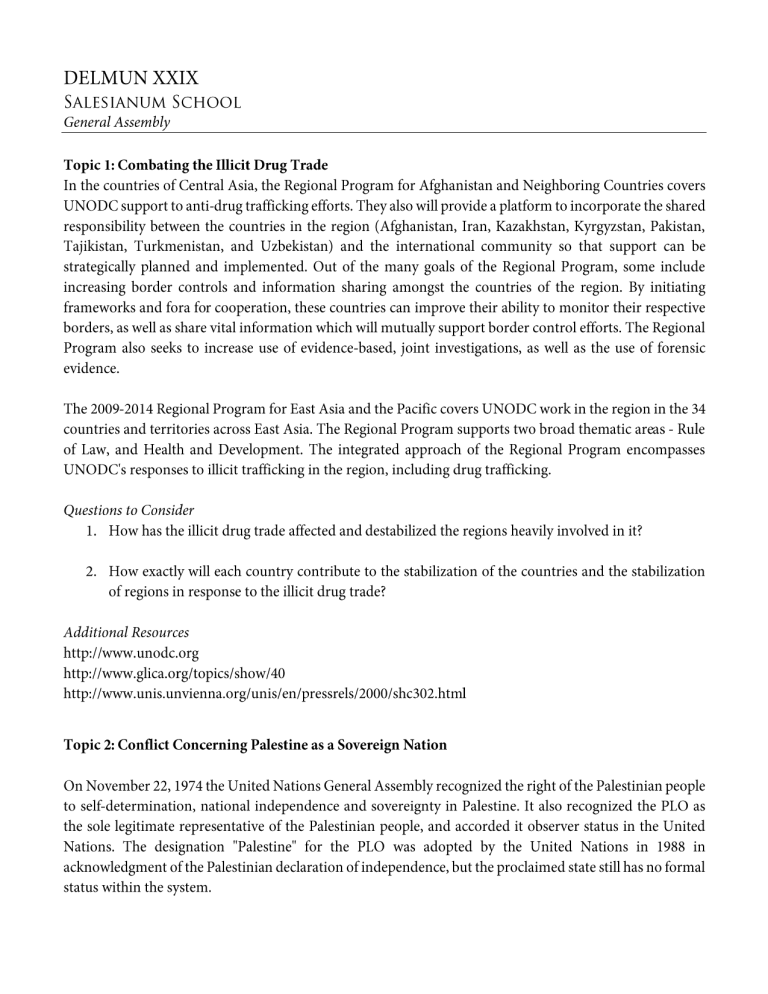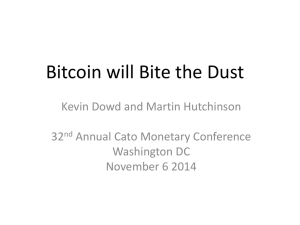Document 14130204

DELMUN XXIX
Salesianum School
Security Council
SYRIAN CIVIL WAR
The Syrian Civil War began during the Arab Spring, on March 15 of 2011, when protests erupted nationwide against the government of President Bashar al-Assad. His forces responded in an especially harsh manner, violently suppressing protests and attacking small towns, leading to over 1,000 civilian deaths by the end of May 2011. Protests turned to outright rebellion on July 29, when seven officers of the
Syrian military defected and formed the Free Syrian Army (FSA). On August 23, a coalition of antigovernment groups, the Syrian National Council, was formed in Turkey in an attempt to organize and streamline opposition forces. However, due to the fractious nature of the rebellion, the opposition remained divided along ethnic and ideological lines. The fighting between government forces and the various rebel groups, including the FSA, escalated up until April 2012, at which point there was a brief cease-fire brokered by the United Nations and the Arab League. It was a failure, however, with both sides repeatedly breaking its conditions. From there the fighting continued, with a major attack on Damascus from the rebels in July of 2012 and combined Hezbollah-Syrian government offensives into rebel-held territory and clashes with the Kurds. Matters were complicated further when ISIS captured the Syrian border town of Azaz from FSA troops on September 18, 2013. Ever since, the three-way war has devolved into an international conflict, with an American-backed coalition performing airstrikes on ISIS and supporting the Syrian rebels, while Russia (in September 2015) began bombing ISIS as well, but supporting President Assad.
Questions to Consider
1. How, if at all, can the Syrian civil war be resolved peacefully? If not peacefully, how can the UN force an end to the conflict?
2. What role does your country play in Syria and the surrounding region? How can that role change or shift to help the situation?
3. What are the possible international effects of the Syrian civil war which could be diminished in magnitude with an end to the conflict? How can understanding these effects aid in negotiations for a solution?
Additional Resources http://www.bbc.com/news/world-middle-east-26116868 http://www.vox.com/2015/9/14/9319293/syrian-refugees-civil-war http://www.theatlantic.com/international/archive/2013/12/understanding-syria-from-pre-civil-warto-post-assad/281989/
Bitcoin Exploitation
Bitcoin is a cryptocurrency which can be virtually mined using a complex algorithm. It has been growing in importance since its introduction in 2009. However, there are multiple issues with the currency, which include volatility and market fluctuation, but mainly stem from its lack of security for users and miners.
There have been many cases of bitcoin theft, which involves the stealing of a private key to an account or bitcoin wallet. Bitcoin has also been involved in money laundering and Ponzi schemes, and is extremely
susceptible to malware. Bitcoin malware come in many forms, including using botnets to mine unauthorized bitcoin, stealing private keys, and using ransomware. Bitcoin is also heavily associated with the online black market, where it (exclusively, on many sites) can be used to purchase child pornography, drugs, weapons, and murder-for-hire services. On a global scale, there have been multiple concerns that terrorists are using bitcoin and the exploitations of the currency listed above to fund their campaigns.
These have come ever further into the international perspective after the coordinated terror attacks on
Paris on November 13, 2015.
Questions to Consider
1. How can bitcoin be regulated or controlled in a manner to make up for its many drawbacks?
2. How can the international community protect against the uses of bitcoin for illegal contraband like weapons and drugs? For funding terrorism?
3. How is your country affected by bitcoin or its illegal uses, such as drug/sex trafficking or terrorism? How can the Security Council use its power responsibly in the manner with which it approaches this issue?
Additional Resources https://www.europol.europa.eu/content/cybercrime-experts-tackle-criminal-exploitation-virtualcurrencies https://www.alienvault.com/open-threat-exchange/blog/how-cybercriminals-are-exploiting-bitcoinand-other-virtual-currencies https://www.cryptocoinsnews.com/ben-bernanke-worried-terrorists-use-bitcoin/


